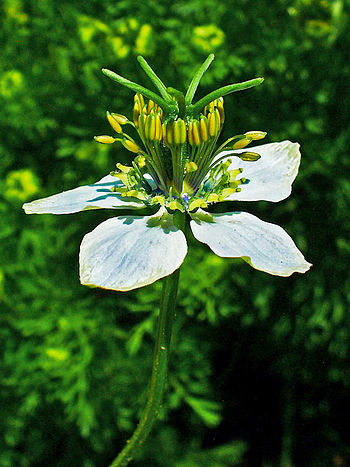
English: Nigella sativa, Ranunculaceae, Small Fennel, Black Cumin, flower. Deutsch: Nigella sativa, Ranunculaceae, Echter Schwarzkümmel, Blüte. (Photo credit: Wikipedia)
Black seed (Nigella sativa), sometimes called black cumin*, is a natural treatment which has been used in Ayurvedic, Chinese, Unani (Japanese) and Arabian medicines. The black seed oil and its thymoquinone (TQ) components are considered to be anti-cancer by actions which alter the genetic changes seen in some cancers. The present study was done to investigate how TQ is able to alter cancer geetics.
TQ has been shown to alter genes which control angiogenesis (the growth of new blood vessels), tumor suppression, inflammation and apoptosis (natural cell death). It has also been shown to suppress osteosarcoma, bladder, pancreatic, breast, lung, skin and colon cancers. Black seed oil is reported to be effective orally. TQ is especially useful because it appears to work through multiple genetic targets at the same time.
TQ has been shown to be safe and effective orally at a dose of 0.6 mg/kg/day. As well, there is evidence that TQ can be effective in treating mild hypertension, high cholesterol, and high triglyceride levels.
CONCLUSION: This article reports good evidence that thymoquinone from Nigella sativa or black seed oil has been shown to be beneficial in anti-cancer therapy.
NOTE: *Black cumin can refer to Bunium bulbocastanum and Nigella sativa. Here we are speaking only about Nigella sativa. Bunium refers to a seed that resembles caraway.
To read the author’s abstract of the article, click on the title of the article. Then, to read the full article, click on the full text icon.
PMID: 24959190.
Summary #677.

